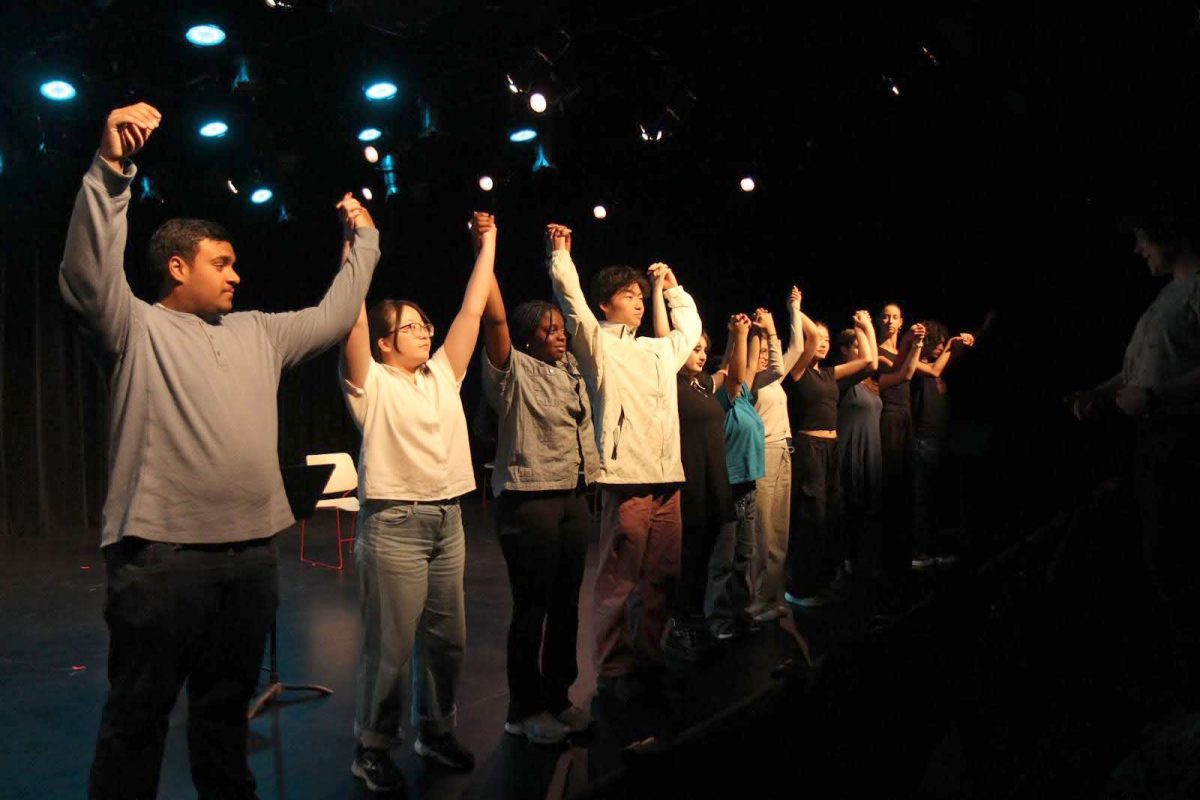Obtaining tickets to Macalester’s annual staged readings of student plays is no small feat. The tickets, though free, are given on a first-come-first-served basis and the box office begins distributing them only a half hour before the show’s start. The show’s 50 tickets per performance usually run out within minutes. I was lucky enough to get my hands on one this year, so here’s a recap for those who missed it.
The evening began with “A Well Planned Out Scheme” written by Alma Capone ’28. In this sitcom-meets-suspense romp, roommates Heidi (Natasha Friedman ’29) and Julia (Violet Armstrong ’29) hatch a plan to surprise their third roommate Amy (Rowyna Kindl ’29) while the fourth roommate Matilda (Agnes Chen ’29) hears snippets of what sounds like a murder plot, but turns out to be a slasher-themed birthday party.
The play balances its building tension with humor to create a dramatic but wholesome payoff. I enjoyed many lines, including Heidi’s “Would it be her scene?” delivered in response to Julia’s wondering whether or not to include Matilda in their plans. All the performers brought verve to the roles, including Cem Ozil ’28 who modulated between haunting and jovial tones when reading the stage directions.
The next play — “Gabriela” by Beja Puškášová ’26 — struck a more meditative and experimental note. Teenage girl Amaryllis (Tara Majkic ’29) awaits the birth of her transgender “cat girl” sister Gabriela (Laurence Jacobian ’28). Though most perceive Gabriela as a boy, her grandmother (Hallie Livingston ’29) knows better.
What follows defies easy summary but, as I understood it, a supernatural projection of Gabriela appears before Amaryllis and urges her sister to convince the family that she is not a boy, but a girl. Before Amaryllis can succeed, though, her mother miscarries and Gabriela’s ghost delivers an existential monologue about “the transsexual heaven.”
Though not always the easiest to follow, Gabriela’s sheer originality suggests a privileging of gestalt over conventional storytelling form. Puškášová’s challenge to linear narrative speaks to the complexity of trans chronopolitics and what it means to both be and become a gendered subject. The potential for capacious interpretation of the play’s stage directions (both Gabriela and Amaryllis transform into “a night sky”) reminded me of the works of other avant-garde playwrights, like Suzan-Lori Parks and Will Arbery.
The final play, “Angst and Entitlement” by Grey Henry ’28, found a balance between the dichotomous styles of its predecessors by adopting a linear narrative and an experimental device. Appropriately angsty teenager Jayden (Danielle Ahouelete ’29) arrives home from school to face a barrage of competing demands from her parents Avery (Vivian Montgomery ’28) and Harper (Tani Gangal ’29). As the family members nag and sass one another, they perform various mundane actions; they open refrigerators, page through magazines, set down their glasses, pick up boxes and tidy up. After each one of these actions, the stage directions—read by Andy Zhu ’29 — identify a different “neglected item.” At the play’s end, when Jayden has stormed off to do her homework, the stage directions provide a comprehensive list of the aforementioned “neglected items” — a move that revealed the family’s collective carelessness. The play’s examination of growing pains served as a great conclusion to a collection of plays concerned with youth and aging.
The thematic ordering of the plays as well as the excellent casting of their roles reflected the discernment of director Sam Stephen ’28, as well as all the students and faculty involved. I have no doubt as to why MacFest’s annual staged reading remains one of the hardest tickets to get at Macalester College.







